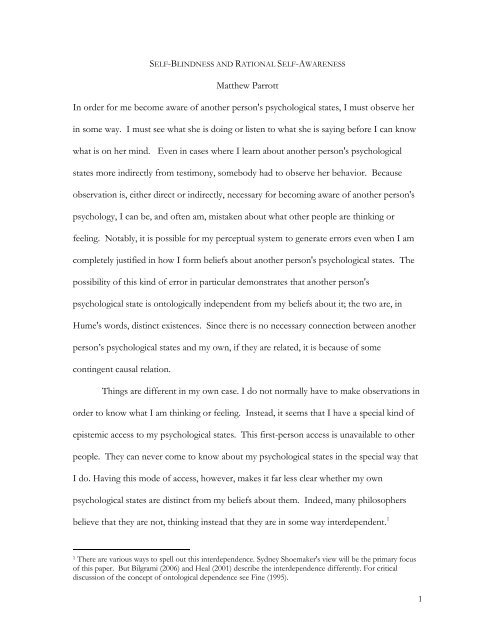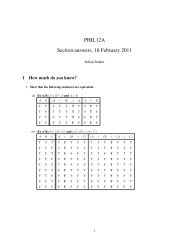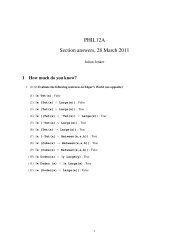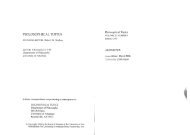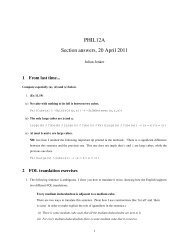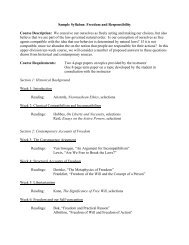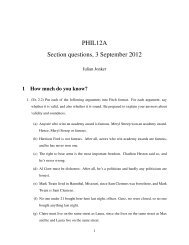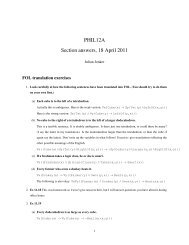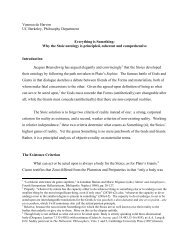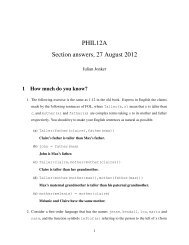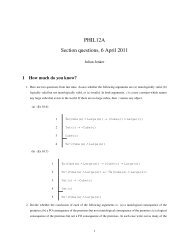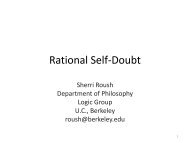SELF-BLINDNESS AND SELF-AWARENESS - Philosophy
SELF-BLINDNESS AND SELF-AWARENESS - Philosophy
SELF-BLINDNESS AND SELF-AWARENESS - Philosophy
Create successful ePaper yourself
Turn your PDF publications into a flip-book with our unique Google optimized e-Paper software.
<strong>SELF</strong>-<strong>BLINDNESS</strong> <strong>AND</strong> RATIONAL <strong>SELF</strong>-<strong>AWARENESS</strong>Matthew ParrottIn order for me become aware of another person's psychological states, I must observe herin some way. I must see what she is doing or listen to what she is saying before I can knowwhat is on her mind. Even in cases where I learn about another person's psychologicalstates more indirectly from testimony, somebody had to observe her behavior. Becauseobservation is, either direct or indirectly, necessary for becoming aware of another person'spsychology, I can be, and often am, mistaken about what other people are thinking orfeeling. Notably, it is possible for my perceptual system to generate errors even when I amcompletely justified in how I form beliefs about another person's psychological states. Thepossibility of this kind of error in particular demonstrates that another person'spsychological state is ontologically independent from my beliefs about it; the two are, inHume's words, distinct existences. Since there is no necessary connection between anotherperson’s psychological states and my own, if they are related, it is because of somecontingent causal relation.Things are different in my own case. I do not normally have to make observations inorder to know what I am thinking or feeling. Instead, it seems that I have a special kind ofepistemic access to my psychological states. This first-person access is unavailable to otherpeople. They can never come to know about my psychological states in the special way thatI do. Having this mode of access, however, makes it far less clear whether my ownpsychological states are distinct from my beliefs about them. Indeed, many philosophersbelieve that they are not, thinking instead that they are in some way interdependent. 11 There are various ways to spell out this interdependence. Sydney Shoemaker's view will be the primary focusof this paper. But Bilgrami (2006) and Heal (2001) describe the interdependence differently. For criticaldiscussion of the concept of ontological dependence see Fine (1995).1
Self-Blindness and Self-AwarenessThis idea is endorsed explicitly, for example, by Akeel Bilgrami, who claims, "ourmental states lack a certain kind of independence from our knowledge of them…possessedby the things of which we have perceptual knowledge, from that perceptual knowledge." 2Bilgrami proposes that a person's knowledge of her own psychological states is "not comeby via anything at all…it comes with the states of minds themselves, for 'free', as it were." 3This suggestive metaphor of "knowing for free" is intended to capture the basic idea that apsychological state is not distinct from its owner's belief (or knowledge) of it. 4In addition toBilgrami, several recent philosophers have defended the idea that a person’s psychologicalstates are constitutively connected to her own beliefs about them. 5These “constitutivetheories” of self-knowledge aim to account for first-person access by grounding it innecessary, constitutive relations.Despite the popularity of constitutive theories, they oppose a natural and simplethought: a psychological state is one thing and a belief about it is something else. This isobviously true with our beliefs about psychological states that belong to others. Why is itnot equally true in our own case? Why should we not think that a person's psychologicalstates and her beliefs about them are also independent from each other? I propose tocapture this notion with the following thesis:2 Bilgrami (2006), pg. 29. cf. Bilgrami (2010).3 Bilgrami (2006), pg. 38.4 Although I am not aware of anyone who holds this view, someone persuaded by Williamson’s (2000) accountof knowledge as a distinct psychological type could think that a person’s psychological states areinterdependent with her states of knowledge but not with her beliefs. The arguments of this paper would applymutatis mutandis.5 See Boyle (2011), Heal (2001), Shoemaker (1994), Wright (1998), or Zimmerman (2006).2
Self-Blindness and Self-AwarenessDistinct Existence Thesis: For any subject a and psychological state M, ~ (M(a) only if abelieves that M(a)). 6Plausible considerations speak in favor of the Distinct Existence Thesis. First there is Hume'swell known opinion that, since all psychological states are distinguishable from each other,"they may exist separately, and have no need of any thing else to support their existence." 7Hume's point strikes me as prima facie true. It does seem that distinguishable psychologicalstates could exist without each other. 8Second, we are both ignorant of and mistaken aboutmany of our own psychological states. We can believe or desire something without believingthat we do and we can wrongly describe our own feelings, desires or beliefs. How does thishappen? Why do we make errors about our own psychological states? The combination ofignorance and error in this domain suggest that the Distinct Existence Thesis is true. Even ifthey turn out to be quite exceptional, we should nevertheless expect an account of why andhow they occur whenever they do. Yet the most promising explanations of error will rest onthe independence of psychological states from beliefs about them. They will maintain thatmistakes occur because a contingent causal relation connecting a person's psychologicalstates with her beliefs breaks down.6 Dependence is also a consequence of an infallibility thesis about self-knowledge. I shall not discuss this sortof view because few people, if any, believe we are infallible about our psychological states. However, ifnecessary, we can reformulate the Distinct Existence Thesis in a way that accommodates infallibility. In that case,the thesis becomes a bi-conditional: For any subject a and psychological state M, ~ (M(a) iff a believes thatM(a)).7 Treatise 1.4.5.5.8 This point is related to Moore's Paradox. The paradox arises because the conjunction (P and I believe ~P) isnot a logical contradiction. Does Moore's Paradox occur at a higher level? Consider the following: I believethat it is raining but I believe that I do not believe that it is raining. Someone who rejects the Distinct ExistenceThesis could claim that this conjunction does entail a logical contradiction on the grounds that the twoconjuncts were not really distinct facts. Thus, how we think about Moore's Paradox is closely related to how wethink about the Distinct Existence Thesis.3
Self-Blindness and Self-AwarenessBut if commonsense intuitions like these support the Distinct Existence Thesis, why dophilosophers endorse constitutive theories? One reason can be found in a well-knownargument presented by Sydney Shoemaker in a number of papers. Shoemaker argues that ifa person's psychological states were ontologically independent from her beliefs about them itwould be possible for someone to suffer from a condition he calls "self-blindness”. Aperson suffers from self-blindness just in case she can know about her psychological statesin only a third-personal way. But, Shoemaker argues, the possibility of self-blindness isabsurd so a person’s psychological states cannot be fully distinct from her beliefs aboutthem. The impossibility of self-blindness is taken by many to show that some sort ofconstitutive view must be true.My purpose in this paper is to defend the Distinct Existence Thesis. I shall do so byarguing in the following two sections that even if self-blindness is impossible the bestexplanation for this need not deny the Distinct Existence Thesis. Shoemaker's argument ismotivated by his conviction that first-person access is epistemically unique. He thinks that ifthe Distinct Existence Thesis were true our first-personal way of accessing psychological stateswould have to be based on contingent causal relations. But, in that case it would no longerbe epistemically distinctive; it would too greatly resemble perceptual knowledge. In sectionthree, I offer an alternative account of the epistemic entitlement to first-person access thatdoes not base its justification on causal relations. We should not deny that first-person accessis epistemically distinct but I do not believe this means we must abandon the simple thoughtembodied by the Distinct Existence Thesis. In the final section of the paper, I return to thecommonsense intuitions that favor Distinct Existence Thesis in order to develop them morefully. I argue that the thesis is preferable to constitutive theories because it allows us to makesense of our fallibility concerning our own psychological states. Since it seems clear that we4
Self-Blindness and Self-Awarenesscan be mistaken about many of our own psychological states, we should avoid theories thatprohibit our fully understanding these sorts of errors.IAccording to Shoemaker, “a self-blind creature would be one which has the conception ofthe various mental states, and can entertain the thought that it has this or that belief, desire,intention, etc., but which is unable to become aware of the truth of such a thought except ina third-person way.” 9Self-blindness is supposed to be analogous to color-blindness. Just asa person who is color-blind can learn information about color in a non-standard way,through reading a book about colors for instance, a person who is self-blind can learn abouther own beliefs, desires, and intentions in a non-standard way, which is to say a completelythird-personal way. 10Instead of having first-person access to her own psychological states,the self-blind person will have to make observations of her behavior in order to know whatshe believes, wants or feels. Moreover, just as the color-blind person does not suffer from acognitive or conceptual deficiency, self-blindness is "supposed to be perceptual or quasiperceptual,rather than cognitive or conceptual." 11 Shoemaker argues that if the DistinctExistence Thesis were true, self-blindness would be possible. It would be possible forsomeone to have the same kinds of psychological states any of us do without having any ofthe normal first-person access that we do. 12Although Shoemaker tailors his argument to many different types of psychologicalstates, each variation rests on a type of thought experiment that asks us to try to imagine a9 (1988) pg. 115.10 Cf. Bilgrami (2006) and Peacocke (2008).11 (1988) pg. 118.12 (1994)5
Self-Blindness and Self-Awarenessself-blind person with respect to a specified type. 13 I will focus on the case of belief but theargument is analogous for other psychological kinds. When he discusses belief, Shoemakerasks us to try to imagine a self-blind man he names George.If George were self-blind, we should be able to imagine that "the total evidenceavailable to a man at a given time should support the proposition that it is raining, while thetotal 'third-person' evidence available to him should support the proposition that he doesnot believe that it is raining." 14In this case, it would seem reasonable for George to assert aMoore-paradoxical proposition like "It is raining, but I do not believe that it is raining,"because this is what his total evidence supports. 15But, Shoemaker points out that anyrational person can recognize that a Moore-paradoxical assertion is inappropriate. Since weare supposing George to be rational and not conceptually or cognitively deficient, we can seethat he will avoid asserting a Moore-paradoxical proposition. Hence he would behave in thesame way any of us would.Because George has mastery of the concept of belief, Shoemaker thinks thefollowing two things will also be true:A) He will recognize that when asked "'Do you believe that P?' he ought to answer 'yes' justin case he would answer 'yes' to the question "Is it true that P?"13 The different versions can all be found in Shoemaker's Royce Lectures (1994).14 (1988) pg. 118.15 There is another puzzle here. Shoemaker claims that the total third-person evidence might justify theassertion of a Moore-paradoxical sentence. Offhand, it may seem that this evidential situation could arisebecause there are two distinct facts involved; one about George's psychology and one about the weather.However, I think that when one really tries to imagine the situation it becomes quite difficult to picture thetotality of George's evidence unambiguously supporting both conjuncts of a Moore-paradoxical proposition.Suppose we include George's utterance of "it is raining" as one component of the "third-person" evidence. Wewill no longer have an evidential situation that conclusively supports George asserting "it is raining but I don'tbelieve that it is raining." Shoemaker oddly seems to grant this at one point, but says that "since the objectionunder consideration" depends on an inconceivable situation (unambiguous evidence for a Moore-paradoxicalproposition) and his argument does not, the objection is defeated. But, the problem for Shoemaker is that itmight be that the reason everyone avoids a Moore paradoxical assertion is because of objective third-personalevidence, because evidence always clearly supports only one conjunct. If that were true, it would be unclearhow the phenomenon helps us understand a distinctively first-personal mode of access. Cf. Shoemaker (1995).6
Self-Blindness and Self-AwarenessB) He will recognize the meaning of 'believe' and "preface his assertions with 'I believe' injust the circumstances in which this is pragmatically appropriate.Plausibly, A) follows from George's being a rational believer with the concept of belief. 16When asked whether or not you believe that P, you, like George, usually consider the truthof P. 17The concept of belief is that of a psychological state responsive to the truth itrepresents. Understanding this connection between belief and truth is a large part of havingthe concept.Having the concept of belief also means George can appreciate the relevance ofpragmatic considerations for self-ascribing beliefs. For example, when I lose my keys, I haveto look for them. Where are they? I don't really know and there is no evidence indicatingtheir location. But, I believe they are in my office. In this sort of case, my saying "I believethe keys are in my office" is a way of making a hesitant assertion about the location of mykeys. Since he has conceptual mastery, George could behave the same way I do when I losemy keys. Like me, he could say "I believe that the keys are in my office" in the appropriatecontexts.Shoemaker therefore concludes that George will behave just like any normal personand self-ascribe beliefs in the exact same conditions any of us would. There would "be16 I actually have some doubts about whether A) is true for George. Shoemaker thinks that the truth of A) iscentral to our concept of belief. But, it seems to me that part of why ordinary believers can answer thequestion "Is P true?" when asked about their beliefs is because they are entitled to presuppose that they have firstpersonaccess to their own cognitive actions. If I did not know what I judged when answering "Is P true?" it ishard to see how I would be rational in considering "Is P true?" as a way of answering a question about mybeliefs. Thus, even though A) is true for us, it may not be fundamental to our concept of belief. I will grantthat A) is true for George for the sake of argument but will return to these issues in section III. For a differentcriticism, see Brueckner (1998).17 This is a point familiar to readers of Evans: "In making a self-ascription of belief, one's eye's are, so to speak,or occasionally literally, directed outward--upon the world. If someone asks me 'Do you think there is going tobe a third world war?' I must attend, in answering him, to precisely the same outward phenomena as I wouldattend to if I were answering the question 'Will there be a third world war?' I get myself in a position to answerthe question whether I believe that p by putting into operation whatever procedure I have for answering thequestion whether p." (1982, pg. 225)7
Self-Blindness and Self-Awarenessnothing in his behavior, verbal or otherwise, that would give away the fact that he lacks selfacquaintance."When we try to imagine George, we can only imagine a person who behaveslike us, which means that we cannot imagine a distinctively self-blind person. This, however,just means that self-blindness is not a genuine possibility. If it were, Shoemaker insists,"there should be something that would show, or at any rate provide good evidence, thatsomeone was afflicted with such self-blindness." 18It is important to keep in mind that George is supposed to be completely unable tobecome aware of his psychological states except in a third-personal way. Even if we canconceive of him lacking first-person access to some psychological states, this is not selfblindness.After all, we lack first-person access to some of our psychological states some ofthe time, but none of us are self-blind. To truly conceive of a self-blind person, we need toimagine a person as sophisticated as we are both psychologically and conceptually withoutany first-person access at all. Is this possible?I agree with Shoemaker that it is not. 19 It is certainly difficult for me to imagine afully rational person with a psychological life as rich as an ordinary adult human without thatperson having first-person access to her own psychological states. Such a person wouldalways have to observe her own behavior to learn about her psychological life but then it caneasily seem that she might have no such life to learn about. Without some prior firstpersonalaccess to her own thoughts, why would she take her own observed behavior toeven be intentional behavior? Why would she not instead take it to be a series of involuntarymovements? Since the person has no direct first-person access to her beliefs or desires itdoes not seem she has any reason to take herself to even be a cognitive agent, presumingthat she can take herself to be anything at all.18 (1994), pg 233.19 Kind (2003) thinks it may be.8
Self-Blindness and Self-AwarenessAlthough I personally find these considerations compelling, I don't believe they areconclusive. In fact, I think one might try to make a case for the conceivability of selfblindnessby imaging someone losing first-person access late in life, after acquiring a greatdeal of rational maturity and conceptual skill. Just as it is difficult to imagine someone blindfrom birth mastering color concepts, it is hard to picture someone who has always been selfblindwith the necessary resources to self-ascribe psychological states. In both cases thedifficulty might be overcome by imagining the person gradually losing the specific mode ofaccess. If we try to imagine George slowly losing his capacity for first-person access, mightwe have more success? I think we might and it might be instructive to try, but I still findself-blindness incoherent. So, for the remainder of this paper, I shall assume that it isimpossible in order to see what this means for the Distinct Existence Thesis.IIDoes Shoemaker's argument from self-blindness refute the Distinct Existence Thesis? Hehimself characterizes the target of the argument as any view that holds "the existence ofthese states and events is independent of their being known in this way, and even of thereexisting the mechanisms that make such knowledge possible." Notice, however, that indescribing his target this way Shoemaker conflates two separate things. First, there is thepossibility that the “existence” a psychological state depends on another state, namely that ofknowing the first. If this were the case, it would be a mistake “to think of the second-orderbelief as a distinct state that is caused by the available first-order belief.” 20 But Shoemakeralso mentions a second possibility; that a psychological state depends on there being what hecalls "mechanisms that make such knowledge possible". These "mechanisms" can be20 (1995), pg. 929
Self-Blindness and Self-Awarenessthought of simply as whatever process realizes our capacity for first-person access. It ishelpful to distinguish these two.State Dependence: For any subject a and psychological state M, necessarily, M(a) only if aknows that M(a).Capacity Dependence: For any subject a and psychological state M, necessarily, M(a) only if ahas a distinct capacity to know that M(a).State Dependence requires that constitutive, rather than causal relations connect a person’spsychological state with her knowledge of it. On the assumption that knowing that Prequires believing that P, State Dependence is a thesis most constitutive theorists wouldendorse. However, because the most promising constitutive views wish to be consistentwith recent evidence from social psychology indicating that we sometimes lack awareness ofour psychological states, State Dependence should also be understood as a generic claim. 21It isa stronger claim because Capacity Dependence follows from it trivially. Nonetheless the two arelogically distinct.Since the Distinct Existence Thesis implies that any of a person's psychological statescan exist independently from her having a belief about it, it is inconsistent with StateDependence. But does the impossibility of self-blindness really show that the Distinct Existenceis false? Does it show that there must be necessary connections between a person’spsychological states and her own beliefs about them? Shoemaker says that the thesis entails"that for each kind of mental fact to which we have introspective access, it is at least logically21 It would therefore strengthen both to read the claims universally. But, I assume that the stronger version ofeither would be unacceptable to most philosophers; although the stronger form of State Dependence does seem tohave been Descartes' view.10
Self-Blindness and Self-Awarenesspossible that there should be creatures in which such facts obtain, and who have the abilityto conceive of them, but who are self-blind with respect to them." 22 However, even if it ispossible for a creature to be "self-blind" with respect to "each kind of mental fact", it maynevertheless be impossible for that creature to be self-blind with respect to all of them. 23Indeed, this is precisely what would happen if Capacity Dependence alone were true.In describing George, Shoemaker argues that he is be unable to become aware of anypsychological states except in a third personal way. If George were self-blind to all of hispsychological states, he would lack a capacity to know about his psychological life in adistinctively first-personal way. Assuming that George's self-blindness is impossible, theargument demonstrates that a person could not have psychological states in the same waythat we do without having a capacity for first-person access to them. Capacity Dependence mustbe true. But why is it true? Why must a subject have a distinctive capacity for first-personaccess? The simplest answer to this question, which I think Shoemaker favors, is that StateDependence is true; a person has a capacity for first-person access because her havingpsychological states constitutively entails that she knows about them. But the downside withthis answer is that it requires we give up the Distinct Existence Thesis. If we wish to hold ontoit, we will need to explain Capacity Dependence another way.22 (1994), pg. 27323 Consider a slightly imperfect analogy. Being a student is independent from receiving an 'A' in a <strong>Philosophy</strong>101. Thus, for any student in my class, it is possible that she does not receive an 'A'. The two states areontologically distinct. But it may nevertheless be impossible for no student to receive an 'A' in this course.Suppose, plausibly, that if it began to look as if all the students in the course were going to receive less than an'A', the grading scale would be recalibrated (this could be a part of the nature of grading for an introductoryuniversity course). In this case, it would be impossible for every student to not receive an 'A', although it ispossible for each student.11
Self-Blindness and Self-AwarenessIIIWe might consider whether Capacity Dependence could be grounded in the nature ofpsychological subjects rather than in the nature of psychological states. Shoemaker sometimeswrites as if he has this sort of thing in mind. For instance, he endorses the idea "that it is ofthe essence of mind that each mind has a special access to its own contents, or more soberlyexpressed, that each person has a special access to his own mental states." 24But if "theessence of mind" includes "special access", couldn't "the essence of mind" explain CapacityDependence? It is, as we have seen, very difficult to imagine a person without first-personaccess, but perhaps this is because having the capacity for this kind of access is afundamental part of what it is to be a rational subject of psychological states.A central aspect of being such a subject is having attitudes like beliefs, desires,intentions that are responsive to appropriate reasons. My beliefs, for example, are normallysensitive to evidence and to justifying reasons bearing on the truths they represent. If Ibelieve that P and am confronted with what I take to be conclusive evidence that P is false, Iwill, if rational, immediately stop believing P. In this way, my assessment of the world, mytake on evidence for or against P, makes an immediate and substantial difference to theexistence and character of my psychological state. As a subject whose attitudes areresponsive to reasons, my sense of good reasons for or against them directly affects themand has the potential to change them.It seems to me that in order for a person's sense of reasons to be able to directlydetermine what her psychological states are she must have a unique capacity for first-personaccess. Tyler Burge has recently stressed that this is necessary for an individual to engage incritical reflection on her psychological states. He claims that "it is constitutive of critical24 (1988), pg. 11512
Self-Blindness and Self-Awarenessreasoning that if the reasons or assumptions being reviewed are justifiably found wanting bythe reviewer, it rationally follows immediately that there is prima facie reason for changing orsupplementing them, where this reason applies within the point of view of the reviewedmaterial (not just within the reviewing perspective)." 25Someone reasoning critically inBurge's sense must turn her attention toward her own psychological states in order tocritically assess and evaluate them. This often culminates in a judgment to the effect that aparticular state is warranted or not by reasons, a judgment that Burge notes necessarily hasthe potential to immediately change the original state. Burge thinks that if our way of knowingour own psychological states rested on some kind of epistemic intermediary, "there wouldnever be an immediate rationally necessary connection" between, for instance, what wedeliberatively judge we ought to believe and what we in fact believe. Why not?In order for someone to engage in critical reasoning about her psychological states,she must be aware of them. Let’s suppose she does so indirectly or in a more third-personalmanner. In that case, she would learn about her psychological states on the basis of evidenceor observation. This is the same kind of epistemic access we have to those psychologicalstates belonging to other people and it seems that we can certainly rationally criticize whatothers ought to believe, want or intend. Yet when it comes to others our judgments aremore like appraisals or recommendations; they do not necessarily determine the existence orcharacter of the other person’s psychological state. Depending on how convincing we are,the person may accept our judgments, but she may also ignore them. When someone takesup this kind of third-person perspective on herself, she treats her own psychological states25 (1996), pg. 257. Burge's argument is directed against what he calls the observational model of self-knowledge.Such a model allows for the possibility of what Burge calls "brute errors" about one's own psychological states.Burge suggests that this possibility of "brute error" is partially responsible for the dissociation between the"reviewing" and the "reviewed" perspective. Although I agree that without first-person access there is a kind ofdissociation, I do not think that the bare possibility of brute errors is the reason for it. The completeexplanation for the dissociation, as I will argue, proceeds along different lines.13
Self-Blindness and Self-Awarenesssimilarly to how she does those of other people. She treats them like facts whose existencecould possibly be independent from her own rational assessments of what her attitudesshould be. From a third-person point of view, her best judgments about what herpsychological states should be need not settle what they in fact are. This is why criticalrational judgments made from a third-person point of view lack an “immediate rationallynecessary connection” to the subject’s psychological states.In fact, because of this it seems to me that Burge overemphasizes the importance ofreflection. The necessity for a special kind of first-person access is really more basic. Simplyhaving rational attitudes requires having a capacity for first-person access whether or not wesubject them to deliberative evaluation. This is because, as rational subjects, we must take theexistence of these states to be exclusively determined by reasons. This is a fundamental tothe nature of the first-person perspective. From that perspective, if I believe that P, it is onlybecause some suitable reason (or some set of reasons) is a compelling indication that P istrue. 26 Hence, if my way of knowing about my belief were not first-personal, if it rested onepistemic mediation of any sort, then my belief that P might exist independently from anyappropriate reasons for holding it. Basing my knowledge of what I believe on evidencetherefore amounts to admitting that the existence of my belief does not depend exclusivelyon reasons that bear on the truth of P. This is because the evidence in favor of my believingthat P is not evidence for the truth of what I believe. Thus, lacking first-person accesswould directly undermine the rational authority of my rational judgments, which is why, inBurge's words, "there would never be an immediate rationally necessary connection"between my sense of what I ought to believe and what I in fact believe. Burge is right to26 Analogous points hold for desires, intentions, and other rational psychological states. These are attitudesthat Scanlon (1998) calls “judgment-sensitive”. Cf. Hieryonymi (2005) and (2009).14
Self-Blindness and Self-Awarenessthink that such dissociation would occur without a capacity for first-person access; but it canhappen prior to critically reflecting on one's psychological states.An example should make this point clearer. Suppose that I come to know that Ibelieve that my neighborhood is unsafe on the basis of behavioral evidence. I recognize, forinstance, that I check the locks on my windows and doors far more frequently than in anyother place I have ever lived. I also notice that I walk extremely quickly through myneighborhood and regularly glancing over my shoulder. This kind of behavior is goodevidence that I believe my neighborhood is unsafe, but it is not good evidence that theneighborhood is actually unsafe. It does not indicate that the proposition is likely to be true. Indeed, the behavioral evidence for what Ibelieve is consistent with there being no good reasons to think my neighborhood is unsafe.Even if we suppose that my self-ascription on the basis of evidence is correct, it is possiblethat my belief is based on no good reasons and that its existence is caused by something else(for instance, my growing paranoia). Coming to know what I believe in a way that ismediated by evidence leaves open the possibility that what I do believe is not determinedexclusively by what I ought to believe. My point is that when a person relates to her beliefsin a first-personal way, this possibility must be closed off. From that perspective, I believethat my neighborhood is unsafe only because it is supported by good reasons.Someone might object that just as considering evidence is a rational way to formbeliefs about my neighborhood, considering evidence is a rational way to form beliefs aboutone’s own beliefs. Indeed, it might be thought that if a person is attempting to learn whatshe already believes, wants or intends, as opposed to what she ought to, she should considerall potential evidence indicating what psychological states she has. 27If one wishes to acquire27 This objection is raised in Shah and Velleman (2005).15
Self-Blindness and Self-Awarenessknowledge, it might be irresponsible to attend to anything less than the total availableevidence.I do think there are cases where it is epistemically responsible to base one’s selfascriptionson evidence. For instance, prior to noticing my nervous habits, I was not awareof my belief that my neighborhood is unsafe. Nevertheless, the belief clearly played animportant role in my life. It may be that the only way I could ever have learned about it wasby noticing behavioral evidence. If so, it seems responsible to acquire knowledge of thisbelief by responding appropriately to that evidence. But this point does not generalize. If aperson’s judgments about what she ought to believe did not normally constitute what shedid believe, she would not have rational attitudes. In that case, there would be no point toher trying to engage in any critical reflection or evaluation of her psychological states.Whatever type of cognition she would be reconsidering would not be rational cognition. AsI have been arguing, rational cognition requires a capacity for accessing one’s ownpsychological states in a direct, first-personal way. It is not that a rational agent cannotsometimes acquire knowledge of her psychological states in a third-personal way. But shecan only do so by distancing herself or disengaging from the more basic first-personstandpoint. If a person completely lacked the capacity for first-person access, if she wereself-blind, her psychological states would remain at too far a distance from her own sense ofreasons and she would cease to be a rational cognitive agent.But none of this entails that our psychological states are necessarily connected; itdoes not entail that State Dependence is true. 28According to the view I have briefly sketched, itis not the nature of psychological states that explains why self-blindness is impossible.Rather, this impossibility is a consequence of a special kind of rational relation a person can28 For an alternative explanation see Peacocke (2009). Peacocke also recognizes that Capacity Dependence can beexplained without denying the Distinct Existence Thesis.16
Self-Blindness and Self-Awarenessstand in to her own psychological states. One is a rational subject only on the condition thatshe relates to those states in a first-personal way, in a way that enables her judgments todirectly constitute her attitudes. The nature of this relation, rather than the nature ofpsychological states, is what requires a subject to have immediate access to both hercognitive actions and to her psychological states. However, these states can be distinctexistences without necessary connections between them. What would necessary is that if asubject relates to a psychological state in a first-personal way she will have a special kind ofaccess to it upon which she can base her beliefs about it. 29IVCapacity Dependence is a modal claim stating that rational subjects necessarily have a capacityfor first-person access. One might think that we are hardly justified in saying we have acapacity like this unless we did in fact know about most of our own psychological states.That is, it might seem that if one has a capacity to phi, one actually does phi. 30 So it seems thatany subject of psychological states will be aware of a majority of them and, moreover, thiswill be necessarily true.Thus, from Capacity Dependence, one can reasonably infer:FPA: Necessarily, for any subject a and psychological state M, it is highly probable that if M(a),a knows that M(a).29 For a different view that rejects State Dependence see Chapter 5 of Peacocke (1999). Although I agree withmuch of what Peacocke says, he attempts to explain first-person access by emphasizes the nature of consciousstates over the nature of rational subjects.30 Even this, however, is questionable. See Squires (1969).17
Self-Blindness and Self-AwarenessBecause Capacity Dependence implies this, we are guaranteed to know about most, even if notall, of our own psychological states. We need only to actualize our capacity for first-personaccess, a capacity we naturally have as rational subjects of psychological states.The inference to FPA may need to be spelled out a bit more carefully. 31 First, wemight need a suitable ceteris paribus clause to rule out inhibitors of the capacity. 32 The elevatorin my building would have the capacity to hold 2,500 pounds even if it someone cut thecables every time more than 2,000 pounds was placed inside. 33 Secondly, when it comes toan agent's capacities (as opposed to an elevator's), the agent in question must try to exercisethe capacity in question. But with these qualifications in mind, it does seem that if a personin the right circumstances does not phi when they are trying to, then they lack the capacity tophi. So if a person who is relates to her psychological states in the ordinary-first personalway has the capacity for first-person access, she will regularly actualize this and thereforeknow about those states. I think this form of reasoning and FPA are both plausible so I willassume they are true. 34From either a pragmatic or epistemic perspective there is not much of a differencebetween constitutive theories and FPA. Either way, it is necessary that most people knowabout the majority of their psychological states. The only significant difference is whether aperson’s psychological states depend on her having beliefs about them. FPA is compatiblewith the Distinct Existence Thesis whereas constitutive theories are not. But does anythingphilosophically important hinge on this difference? Why insist that the Distinct ExistenceThesis is true?31 Ideally, one would like to make the degree of probability more precise.32 There is a risk that a ceteris paribus clause will make the conditional trivial. This is a familiar point fromGoodman. However, since I do not intend FPA to be an analysis of any concept, I will set the concern aside.33 Discussions of “masking” can be found in Johnston (1992) and Lewis (1997).34 I actually think that FPA could reasonably be considered a datum in discussions of self-knowledge.18
Self-Blindness and Self-AwarenessEarly in this essay, I mentioned that our commonsense intuitions favor the DistinctExistence Thesis. I think that this is enough reason to believe it. We should not positnecessary connections between things that seem to be causally discreet. But even if we agreewith Hume that psychological states “may exist separately, and have no need of any thingelse to support their existence," this is not a conclusive argument against constitutive views.Moreover, there may be countervailing theoretical reasons to accept a constitutive theory.For example, some functionalist theories of mind individuate psychological states in terms oftheir causal relations to each other. Thus, for something to be a desire it would need to berelated to other states, including, plausibly, beliefs about it. To the extent that one is drawnto a functional analysis, one may also be drawn to a constitutive view rather than the DistinctExistence Thesis.However, constitutive theories face some difficulties. 35 One of the more serious isthat we are often ignorant or mistaken about our own psychological states. The existence oferrors in this domain strongly suggests that we should be fallibilists about knowledge of ourown psychological states. We should accept that any justification we have for beliefs aboutthem is defeasible. The trouble for constitutive theories is that necessary constitutiveconnections between psychological states do not allow for errors. If the existence of aperson’s psychological state constituted her knowledge of it in some way, it is hard to seehow she could ever be mistaken. A universal constitutive theory is therefore incompatiblewith fallibilism. Since nearly everyone rejects infallibilism, an advocate of a constitutivetheory must allow for exceptions to the necessary relations she thinks normally hold. Shewill typically do so by citing additional conditions on those relations.35 A different objection than the one discussed here has received a fair amount of attention. It is thatconstitutive theories make self-knowledge neither a cognitive nor an epistemic “achievement”. For discussionsee Boghossian (1989), Fricker (1998) and Peacocke (1999). At least some constitutive theorists seem happy toaccept this consequence (cf. Bilgrami (2006)).19
Self-Blindness and Self-AwarenessFor example, Shoemaker believes that if one has a psychological state then one will“automatically” have a “corresponding second-order belief”. However, he also thinks thisrequires "a certain degree of rationality, intelligence, and conceptual capacity (here includinghaving the concept of belief and the concept of oneself)." 36 It is therefore possible that aperson’s psychological states to not be constitutively connected and for her to lack acorresponding second-order belief, but only if she also lacks "a certain degree of rationality,intelligence, and conceptual capacity". These features must be in place in order for her firstandsecond-order states to be constitutively related. 37It is plausible that one must have a degree of conceptual skill and intelligence inorder to self-ascribe a psychological state. Let us therefore assume that without these thereis no constitutive connection between a subject’s first-order states and her beliefs aboutthem. However, it seems rather implausible that every time a person makes an error aboutone her psychological states it is due to a deficiency in her intellect or her conceptualabilities. What about rationality? Could it be that a person commits errors only when she isnot being rational?There are two directions in which one could try to explain how rationality isnecessary for constitutive connections between psychological states. First, according to apopular version of a Freudian idea, we lack awareness of our unconscious psychologicalstates, which are “irrational”. It is because they are irrational that we push them outside of36 (1994), pg. 24337 Shoemaker offers two proposals for understanding the dependence between a person’s psychological stateand her belief about it. The second is that the two states have different “core realizations” but overlappingtotal realizations. One might prefer this if she wished to maintain that some causal relation connected aperson’s psychological states with her beliefs about them. It might be thought that if we allow causal relationsat the level of core realizations, then we can account for fallibility. The cases in which we make mistakes arejust the ones where that causal relation breaks down. The problem, however, is that since the causal relationdoes break down, the states are not always connected. If we insist that their “total realizations” are neverthelessnecessarily connected in some way, it can only be under certain conditions. To account for our fallibility, as Ishall argue, one must explain why those conditions matter. Cf. Campbell (2011).20
Self-Blindness and Self-Awarenessour awareness. Someone could argue that unconscious states are of a fundamentallydifferent kind and, therefore, not constitutively connected to any second-order beliefs.Moreover, it is natural to think that bringing unconscious states to awareness requires one tofirst make them less irrational. This is what Bilgrami thinks happens at a “second stage” oftherapy. He suggests that gaining awareness of unconscious states means that a person can“consider first whether the discovered dispositional or motivational mental state is inconflict with her commitments, then, if it is, to see whether she wishes to bring theconflicted disposition in alignment with her commitments by changing the commitment orby changing the disposition.” 38This process sounds quite similar to the sort of reflectivecriticism and evaluation we considered earlier. If this were the result of “cognitive inquiry”into our unconscious states, then it seems one could, in this way, transform irrational statesinto fully rational ones, or at least abandon them. Yet even if this were to happen onoccasion can it explain errors outside of a psychoanalytic context? While focused on writingthis paper, I may be unaware of my desire to listen to country music. But must I be soashamed of it that I repress it? The constitutive theorist’s main suggestion is thatirrationality explains ignorance; it is why my desire is not necessarily tied to any beliefs aboutit. But not all of the psychological states we misjudge are irrational in some quasipathologicalor neurotic sense.A better way to support a constitutive view is to claim not that my desire to listen tocountry is irrational in some problematic manner but that it is not even within the realm ofreason--that my desire to listen to country music is a non-rational state, something more likean urge or an impulse to listen to country, something that could never be based on reasons.In that case, my lack of knowledge would be explained if primitive states of this kind were38 (2006), pg. 318.21
Self-Blindness and Self-Awarenessontologically independent from beliefs about them. It seems that one could think thatconstitutive relations hold only for more rational psychological states.For the sake of argument, let us stipulate that non-rational states are notconstitutively related to beliefs about them, which would allow us to explain simpleignorance. 39 But could we explain errors the same way? It seems to me that we all makemistakes about, for instance, what we want for dinner tonight or what we believe about adifficult philosophical passage. It might seem that we can sufficiently understand these byexplaining both a person’s ignorance and her incorrect self-ascription. It could then beargued that if the constitutive view can explain the first it need not address the second.There is, however, a problem with this line of thinking. Conscious self-ascription occupies aperson’s attention and it is often the result of her self-conscious reflecting on herpsychological states. 40 For example, you might ask me what sort of music I would like tohear with dinner. This invites me to reflect upon relevant desires. After doing so, I might saythat I would like to hear country but suppose I am wrong and that I really desire to listen tothe blues. Given the level of conscious engagement with your question it seems unlikely thatthere is nothing in the scope of my conscious attention. 41 Even if reflection did not reveal myactual desire to listen to the blues, it seems that it must have uncovered some kind ofmotivational state. Otherwise, the sensible thing to report would be my lack of preference. 4239 Consider, however, how we would make sense of losing awareness of a particular psychological state.Suppose that I am fully aware of my desire to listen to country music, which in my mind is based on very goodreasons, but suddenly become distracted by something in my vicinity. Should my desire persist, it does notseem that it would be less rational simply because I was not presently aware of it.40 Cf. Peacocke (1998).41 It seems even less plausible in cases where I am asked to reflect on what I believe. When someone asks meto think about what I believe about a difficult philosophical passage, I may give her the wrong answer. It doesnot seem that in this case the belief I actually have is of a more primitive non-rational kind.42 In a case different than the one I am imagining, a person can self-ascribe an urge or impulse. For instance, Imight say ‘I have a hankering for opera’ or even ‘I have an urge to listen to opera’. Do urges self-ascribed inthis manner remain outside the domain of rational self-awareness because they are “non-rational”?22
Self-Blindness and Self-AwarenessBecause self-conscious reflection on one’s psychological states can result in errors, it seemsthat at least some mistakes involve more than a lack of awareness. 43Consider the following example. During dinner, my spouse may gently nudge meand say she can tell that I’m not enjoying the country music. She knows me pretty well; soshe says “Wouldn’t you prefer the blues?” Alternatively, after you begin playing the countrymusic, I may notice that I am not enjoying it as much I thought I would. A natural thoughtwould be that I was wrong about what I desired, not wrong that I desired something. In thiscase, it seems that I know of the existence of a particular state but get its valence wrong. Ipersonally think this sort of thing happens often, but my argument against the constitutivetheory requires only that it happen often enough to be worthy of explanation. 44An advocate of the constitutive view may wish to deny that a person could make amistake in the way I am suggesting, by misidentify her psychological states. 45She mightobject that misidentification only seems conceivable on the assumption that a person’sbeliefs about her psychological states rest on causal relations, which is precisely what theconstitutive view denies. But there is no independent reason to think that a person can beaware of the existence of her psychological states but wrong about its valence. Even if thisobjection is correct, even if a psychological state cannot be misidentified, a successfulconstitutive view must still offer a more substantial explanation of error. This is because,43 Cf. Wilson (2002) and Schwitzgebel (2010).44 One might be tempted to say the error consists simply in the fact that I assert or believe something false.Since I do not possess a desire to listen to country music, my saying that I do is a kind of mistake. Notice,however, that this changes the nature of the error. It may be true that violating a norm of assertion or of beliefis, in some sense, a mistake, but it is not a mistake a person makes about her psychological state. In fact, theexplanation for why I wrongly assert or believe something false usually rests on my misjudging an actualpsychological state.45 Bar-On (2004) and (2009) denies that it is impossible for a person to misjudge or misidentify a psychologicalstate. In her estimation, first-personal judgments are immune to these sorts of errors. I think this is wrong. Itseems to me possible for a person to wonder what it is they want to listen to during dinner whileacknowledging that they want to listen to something. Presumably, Bar-On would argue that in these casesone’s desire is indeterminate but I do not see why that must always be the case.23
Self-Blindness and Self-Awarenessaccording to the constitutive theory, second-order beliefs exist primarily because they arenecessarily related to the first-order states they are about. However, in cases of error, thereis no necessary connection; so they must exist for other reasons.The most plausible explanation will appeal to a transition from one state to another,a minimally causal transition that could on occasion fail. 46 A causal failure might derail areliable tracking mechanism or, due to a lack of attention, we may fail to grasp the properjustification or evidence for what we should think about our psychological states. If therewere normally some transition between psychological states and our beliefs about them,mistakes could be explained on the basis of failures in the causal processes that supportedthis transition. I think a causal explanation along these lines is very difficult to provide if weaccept a constitutive view. If there is no causal relation between my psychological states andmy beliefs about them, it does not seem that a contingent transition could fail. But thenhow do errors occur? 47It is possible for a proponent of a constitutive view to propose that,although second-order beliefs are usually constituted by first-order states, false ones arecausally generated by non-rational states. Whether or not this proposal can succeed will, Ithink, ultimately be determined empirically. But prima facie it does not seem promising. Oneissue is that, since non-rational states do not always cause false second-order beliefs, sincethey often exist without causing any self-ascriptions, one must clarify the circumstances in46 cf. Boghossian (1989): "I know of no convincing alternative to the following style of explanation: thedifference between getting it right and failing to do so (either through ignorance or through error) is thedifference between being in an epistemically favorable position with respect to the subject matter in question--being in a position to garner the relevant evidence--and not." (pg. 76) Boghossian's discussion seems toindicate that a problem for views like Shoemaker's is that they have no explanation of error, but he mistakenlythinks the only alternative explanations are either evidential or inferential. The view I have proposed in thispaper is neither.47 Zimmerman (2006) argues that a constitutive theorist must embrace disjunctivism about first-person access.The proposal that our ignorance or error involves a more primitive non-rational state would be a sort ofdisjunctivism. However, Zimmerman also claims that disjunctivism about psychological states is far lessplausible than a similar view about perception on the grounds that no qualitatively indiscernible states thatcould reasonably be mistaken for rational psychological states.24
Self-Blindness and Self-Awarenesswhich they do causally generate errors. More qualifications will therefore be needed tosupport the constitutive approach. The problem is not that constitutive views make errorsimpossible but they do needlessly complicate their intelligibility.At first glance, the constitutive approach can seem attractive because we are notusually wrong about what we think or feel. Most of the time we get the existence and thecharacter of our psychological states just right and we usually do so in a special way. But anequally important truth is that a person could be wrong about the existence or character ofany one of her psychological states. I have tried to illustrate how we can accept both of theseimportant truths about what it is like to for us to be psychological subjects. An importantlesson to take from this essay is that the Distinct Existence Thesis is consistent with an accountof first-person access that implies FPA. In that case, because first-person access wouldgrounded in the nature of rational cognitive agents, one could accept the Distinct ExistenceThesis while nevertheless acknowledging that first-person access is completely unique froman epistemic perspective. This would not be a constitutive theory but I think it would haveall that makes those sorts of views appealing.ReferencesBar-On, Dorit (2004). Speaking My Mind. Oxford: Oxford University Press.- (2009). “Bilgrami, Akeel (2010).(2006). Self-Knowledge and Resentment: Cambridge: Harvard University Press.Boghossian, Paul (1989). “Content and Self-Knowledge”. In Peter Ludlow and NorahMartin (eds.). Externalism and Self-Knowledge.25
Self-Blindness and Self-AwarenessBoyle, Matthew. (2011). “Transparent Self-Knowledge”Breuckner, Anthony. (1998). “Shoemaker and Second-Order Belief”Burge, Tyler (1996). “Reason and the First-Person”. In Crispin Wright, Barry Smith andCynthia MacDonald (eds.) Knowing Our Own Minds. Oxford: Oxford University Press.Campbell. John (2011). “Intelligible Causation”Evans, Gareth (1982). The Varieties of Reference. Oxford: Oxford University Press.Heal, Jane (2001). “On First-Person Authority”. Proceedings of the Aristotelian Society (102): 1.Hieronymi, Pamela (2005). “The Wrong Kind of Reason”. Journal of <strong>Philosophy</strong> (102): 9.-(2009). “Two Kinds of Agency”Fine, Kit (1995). “Ontological Dependence”. Proceedings of the Aristotelian Society (95).Fricker, Elizabeth (1998). “Self-Knowledge: Special Access versus Artefact of Grammar—ADichotomy Rejected.”Lewis, David (1997). “Finkish Dispositions”. In his Papers in Metaphysics and Epistemology.Cambridge: Cambridge University Press.Johnston, Mark (1992). “How to Speak of the Colors”. Philosophical Studies(68): 3.Kind, Amy (2003). “Shoemaker, Self-Blindness and Moore’s Paradox”. Philosophical Quarterly(53): 210.Peacocke, Christopher (2009). Truly Understood. Oxford: Oxford University Press.- (1999). Being Known. Oxford: Oxford University Press.- (1998). “Conscious Attitudes, Attention, and Self-Knowledge”.Scanlon, T. M. (1998). What We Owe to Each Other. Cambridge: Harvard University Press.Schwitzgebel, Eric (2010). “The Unreliability of Naïve Introspection”. Philosophical Review(117): 2.Shah, Nishi and J. David Velleman (2005). “Doxastic Deliberation”26
Self-Blindness and Self-AwarenessShoemaker, Sydney (1994). “Self-Knowledge and Inner Sense” in his The First PersonPerspective and Other Essays. Cambridge: Cambridge University Press.- (1995). “Moore’s Paradox and Self-Knowledge”.- (1988). “On Knowing One’s Own Mind”. in his The First Person Perspective and OtherEssays. Cambridge: Cambridge University Press.Squires, Rogers (1969). “Memory Unchained”. Philosophical Review (68).Williamson, Timothy (2000). Knowledge and Its Limits.Wilson, Timothy. 2002. Strangers to Ourselves. Cambridge: Harvard University Press.27


